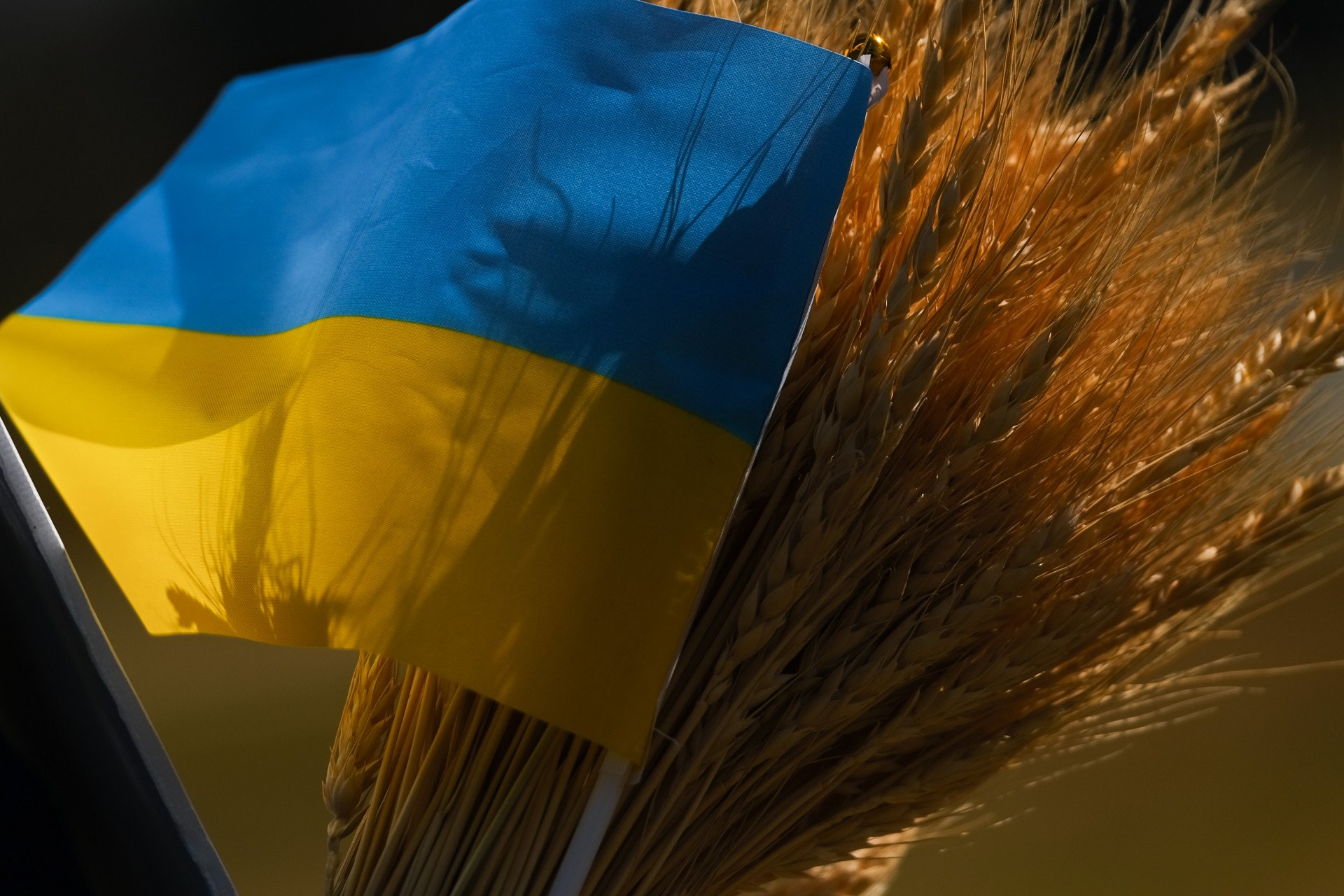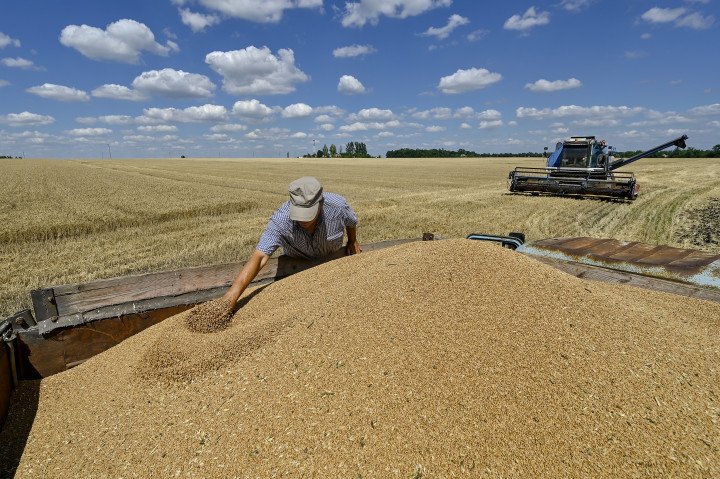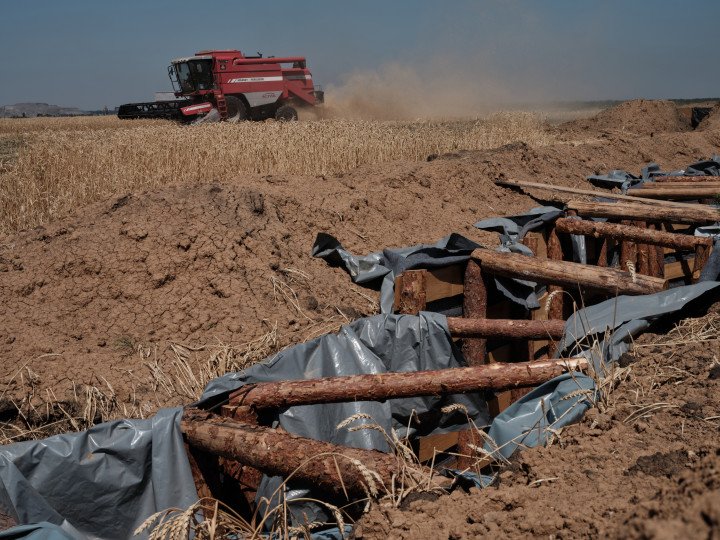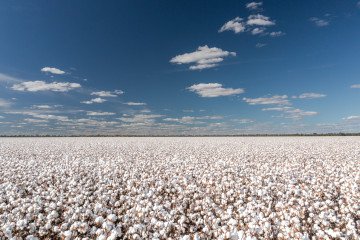- Category
- War in Ukraine
Starvation as a Method of Warfare or How Russia Weaponizes Ukrainian Grain

Ukraine is one of the leading nations in grain export globally, known as the breadbasket of the world. Russia, since the full-scale invasion, has been exploiting Ukraine’s grain through illegal exportation, targeting Ukraine’s farmland. It has even broken a signed UN initiative agreement. What impact has this had globally and what is being done to combat ‘weaponised grain’?
“Russia has cynically attempted to prevent Ukraine from exporting its grain, prioritizing its own aims above global food security,” a UK delegation announced this month. Before Russia’s full scale invasion, Ukraine accounted for around 10% of global wheat exports and 12% of corn and barley exports. Agriculture is central to the Ukrainian economy providing 14% of jobs in Ukraine and 40% of their export income.
Russia has repeatedly attacked Ukraine’s grain storage and export infrastructure, systematically acquiring grain from occupied Ukrainian territory. Arable land has also been contaminated by mines. Farmers have been forced to sell their produce to Russian occupational forces, and their farms and agricultural machinery have either been stolen, damaged or destroyed.
“Food security is another casualty of Russia’s unnecessary and unprovoked war,” the UK’s Foreign Commonwealth and Development Office wrote.

Starvation as a method of warfare:
Ukraine is key for the global food market specifically in food crisis countries and territories such as Africa and the Middle East. In July 2022, Russia, Ukraine and Turkey signed the ‘Black Sea Grain Agreement’. Before the full-scale invasion, 98% of grain exports flowed through the Black Sea ports.
The "Initiative on the Safe Transportation of Grain and Foodstuffs from Ukrainian ports” was seen as an instrumental move in addressing fears of food shortages worldwide.
“Today, there is a beacon on the Black Sea. A beacon of hope, a beacon of possibility, a beacon of relief—in a world that needs it more than ever,” UN Secretary-General Antonio Guterres said at the signing ceremony, but hope was transient.
Less than a day after the agreement was signed, Russia fired missiles at Odesa port using high precision Kalibr missiles.
Two years ago today, Ukraine signed a grain agreement with Russia. The deal was supposed to ensure the safety of commercial shipping in the Black Sea. But Russia broke it. pic.twitter.com/zFz5zUCTts
— UNITED24 Media (@United24media) July 22, 2024
A year later, July 2023, Russia refused to sign an extension of the deal. Experts claim that Russia used their exit to weaponize grain, as during the second half of 2023, Russia’s grain exports reached a record high. Dmitry Polyanskiy, Russia's Deputy UN Ambassador, claimed that the corridor was used to “wage provocations and attacks against Russian civilians and military objects,” but did not provide any evidence to support his claim.
"Russia is blackmailing the world," Ukraine's Foreign Minister Dmytro Kuleba said. "This blackmail affects the lives of millions of Ukrainians and tens of millions more around the world.”
Within a day of Russia pulling out of the deal, the price of grain rose by 8% across global markets. Since the full-scale invasion, countries such as Mayanmar saw the cost of their food basket increase by 80% according to Global Report for Food Crisis (GRFC).
Russia is using “hunger as a weapon,” Zelenskky said in a Presidential address. “Without our exports, it is not simply a shortage, but a threat of famine for more than a dozen countries in Africa and Asia.” The United Nations’ World Food Program (WFP) estimated that without the full-scale war, Ukraine’s farmland could feed around four hundred million people.
Between July and October 2023, 17 separate attacks on Ukraine’s ports, grain facilities, and civilian ships, destroyed 300,000 metric tons of grain according to the Centre for Strategic International Studies (CSIS).
Global Rights Compliance (GRC) has found an extensive amount of evidence that Russian forces have “seized” Ukrainian agricultural facilities around Berdiansk, in the Zaporizhzhia region, Kamianka-Dniprovska, Melitopol and more. They report that this constites prohibited conduct under international humanitarian law that may amount to war crimes, including the war crime of starvation as a method of warfare.
Starvation as a method of warfare is prohibited by both international humanitarian law (IHL) and international criminal law.
Under the Rome Statute, the intentional use of starvation of civilians constitutes a war crime in the course of international armed conflict. Russia is consistantly attempting to remove Ukraine from the market impacting the access of millions of civilians in some of the most food insecure regions of the globe—such as the Horn of Africa, the Sahel, Yemen, and Afghanistan.
Russian attacks on ports and infrastructure:
Russia’s targeted campaign of attacks against Ukrainian agriculture has been well-documented. Since leaving the agreement in July 2023, up to April 2024, Russia attacked Odesa’s port infrastructure 39 times. 215 facilities, 153 vehicles and 8 civilian vessels have been damaged or partially destroyed, Oleksandr Kubrakov announced on X.
Since then, the figures in relation to attacks on Odesa and other key export ports and their infrastructure has increased.
May 1st 2024, a Russian ballistic missile attack killed three people and injured three others in Odesa’s Port and Russia launched 20 drones and five missiles at Ukraine on July 10th 2024, killing two people in the Black Sea region of Odesa, damaging port infrastructure and an energy facility. These are not isolated incidents and attacks on the region continue.
Overnight, in the course of bombing Ukraine's grain supplies near the Romanian border, Russians struck NATO territory with Iranian Shahed drones.
— Jay in Kyiv (@JayinKyiv) July 24, 2024
And absolutely nothing will be done about it. pic.twitter.com/YLfRUC1Mzk
The Danube River ports have also been subjected to many Russian attacks. They accounted for around a quarter of grain exports before Russia pulled out of the U.N.-backed deal but has since become one of the main export routes, along with Greater Odesa. Exporting 90% of all agricultural exports.
On 2 August 2023 Almost 40,000 tonnes of grain were damaged due to a Russian drone strike on Ukrainian port facilities at Izmail on the River Danube.
Attacks haven’t just been limited to ports. On 9th March 2024, a large grain silo was completely destroyed in a Russian missile attack in Dnipro region striking one of Ukraine’s largest agrarian holdings, Ukrlandfarming, who since the full scale invasion, have suffered losses at around 1 billion U.S dollars as of the end of 2023.
Targets against farmland and their farmers:
The war has contaminated an estimated 2.8 million hectares of Ukrainian farmland. In June 2023, the Khakhovka Dam in the Kherson region was blown up, causing widespread flooding to dozens of towns and villages in the area, displacing civilians, destroying local farmland, agriculture and fisheries. The Kherson region was one of Ukraine’s most fertile and productive regions.
Not the before and after we wanted but the before and after we get.
— UNITED24 Media (@United24media) June 10, 2023
Kakhovka Reservoir. pic.twitter.com/ENfpAeR7T6
"The dam was the only source of water for irrigation," First Deputy Minister Taras Vysotsky told the BBC. "The dam and the pumping station in it were needed for us to take this water and deliver it. This is now destroyed. If farmers are going to have water lines, it should be built again from the beginning."
According to GRFC, damage from the dam breach led to 377 million U.S dollars of crop losses alone.
Ukraine’s prime agricultural lands have been decimated by mines and explosive ordinance devices (EODs). An estimated 29% of the country is contaminated with landmines—making it one of the most mined countries in the world.
14 farmers have been killed, and 23 others injured in the fields from Russian mines and shelling in the year and a half since the liberation of the right bank of Kherson region, according to the Center of Journalistic Investigations.
⚡ 14 farmers have been killed, and 23 others injured in the fields from Russian mines and shelling in the year and a half since the liberation of the right bank of Kherson region, according to the Center of Journalistic Investigations.pic.twitter.com/1FtHC9pyYw
— UNITED24 Media (@United24media) July 21, 2024
Investigations into stolen Ukrainian agriculture:
In 2023 the “4 million tones of grain stolen from occupied territories allowed the Kremlin to set world records for wheat sales in global markets,” reported the Ukrainian World Congress in January 2024.
This month, the National Resistance Centre of Ukraine found that Russia has stolen more than 80 thousand tons of Ukrainian grain in their latest harvest from the temporarily occupied Donetsk region. Since the beginning of the year, Russian forces have organized more than 15 similar shipments from the port of Mariupol, totalling to 165,000 tons of cargo.
Activists called "Cyber Resistance" recently gained access to mail belonging to Zakhary Dzhioev, the deputy head of Russia’s Federal Agency of Sea and River Transport, confirming that they are exporting Ukrainian stolen grain.
The BBC found significant evidence that Russian forces in occupied regions are stealing sunflower seeds from local Ukrainian farmers. They tracked groups and chats in social media channels and found that seeds are transported from southern and eastern occupied parts of Ukraine to Russia.
One farmer told the BBC, "we had 1,200 tonnes of sunflower seeds and 860 tonnes of wheat in our warehouse," he says. "And they (the Russians) looted everything. At first, they tried to be polite with our guard.They just pretended to be nice. They loaded all the harvest and took it away. And the guard, what could he do? They beat him." The farmer said that his crops were worth £700,000 ($856,000) and the equipment he lost was worth nearly £1.5m.
Russia is currently selling oil from Ukraine’s Melitopol oil extraction plant in the occupied Zaporizhzhia region. Their website has listed themselves as a “Russian manufacturer” working under the Russian Federation.
Molfar investigated and found a company called ‘Crimean Sea Ports’ which is engaged in the sale of stolen Ukrainian grain. According to their report, grain is exported from the temporarily occupied territories of Ukraine to Crimea, and then transported to the Kerch port to be sold to foreign companies.
As of February 2024 Russian forces caused an estimated USD 10 billion in damages and 70 billion U.S dollars in losses, though since numbers were published by the GRFC, the figures have increased. Attacks on Ukraine’s grain ports, farmland, farmers and export infrastructure is evidently widespread and systematic.

How does Ukraine combat Russia’s war on grain?
At the end of next month, August 2024, the UK will supply DNA testing technology to combat the grain theft crisis by Russia in Ukraine. The technology will determin the grains country of origin and establish the precise region in which a crop was grown.George Eustice, the Environment and Food Secretary of the UK, says that the UK government is giving £1.5m to fund the project which will ensure that stolen Ukrainian wheat does not find a route to market.
In February 2024, Oleksandr Kubrakov, Deputy Prime Minister for Restoration, Territories and Infrastructure Development of Ukraine, announced that Ukraine has shipped a wartime record of 5.2 million metric tons of Ukrainian grains, oilseeds, and other farm products from its Greater Odesa ports under the Ukrainian corridor. In total, the cargo turnover amounted to 8 million tons of goods.
The Ukrainian corridor is a route passing through Romania’s, Bulgaria’s, and Turkey’s territorial waters and has enabled Ukraine to resume high volume shipments of agricultural products since October 2023.
In May 2022, the European Commission launched the Solidarity Lanes Action Plan to establish alternative logistics routes via rail, road and inland waterways. They reported that as of April 2024, they have ‘exported 136 million tones of goods, including around 70 million tonnes of grain, oilseeds, and related products. They have enabled the export of around 54% of Ukraine's grain since the start of the war.’
Ukraine and their allies continue to keep grain exports flowing, while Russia continues to destroy Ukrainian farmland—and while one-fifth of Ukraine continues to be occupied— Russia will continue to attempt to diminish Ukraine’s agriculture and steal from the ‘bread basket of the world’.
-46f6afa2f66d31ff3df8ea1a8f5524ec.jpg)
-35249c104385ca158fb62273fbd31476.jpg)


-554f0711f15a880af68b2550a739eee4.jpg)



-206008aed5f329e86c52788e3e423f23.jpg)